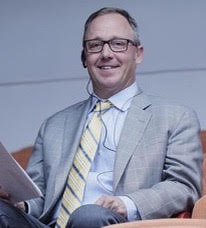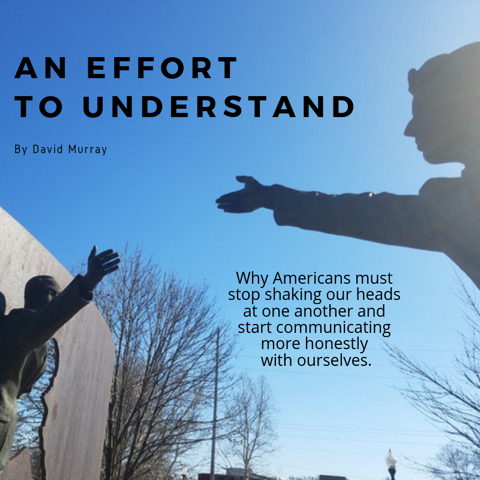This article was written by David Murray, editor and publisher of Vital Speeches of the Day.

I’d been brought up—by two writer parents at the dinner table and by Phil Donahue on TV—to believe that communication could solve anything.
It wasn’t only me: My whole American generation was led to believe that racial tensions would be eased by a “national conversation.” Environmental problems could be solved if only everyone could be made to understand the facts. Psychological problems could be solved by talk therapy, and encounter groups. The nightly news was full of “labor talks,” “disarmament talks” and “peace talks.” The noisiest social issues would one day be resolved, with patience and communication. And if they couldn’t, then good people could at least agree that “good people can disagree.”
Now? As the nation staggers from one of the most contentious elections in its history to the next, it’s starting to seem as if communication can’t solve anything.
Now, talk therapy is a supplement to Prozac, not the other way around. We’ve had national conversations about race until we were blue in the face. Online discussions instantly devolve into attempted rhetorical murder. People dread their family holiday dinners and exchange tips on how to avoid controversial—read, meaningful—subjects. And woe to the pipsqueak who suggests that the contentious political issues of our time can be resolved if only we can open our hearts and minds and listen to one another.
But I’m not willing to give up on words yet. Inspired by my writer parents and hundreds of communicators I’ve known, I have given my whole career to communication, writing on political, business and personal communication for more than 25 years. And if I know communicators—the writers and editors I’ve been drinking with in local taverns and hotel bars around the country and the world—you’re not willing to give up yet, either.
How many times have you and I pounded the happy-hour high-top in frustration that if only CEOs and politicians, church leaders and parents knew what we know about communication, our workplaces, homes, communities and country would be a better place to live?
Maybe, in what promises to be a rhetorically riotous run-up to the 2020 presidential election, it’s time for communicators to put our money where our mouth is.
I’ve collected my own toughest and most candid writings on communication, and edited them into a book that that I hope will help Americans communicate more effectively with the people they love, the people they work with and even the friends and strangers against whom they rage, across the political divide.
The book is called An Effort to Understand. Perhaps you’ll recognize those words. They were drawn from the speech Robert Kennedy gave in the immediate wake of Martin Luther King’s assassination. Kennedy said that in this particular country, we need to make an effort to understand one another. Which starts, of course, with understanding ourselves. As the subtitle of my book suggests, I believe we need to go one further, and “stop shaking our heads at one another and start communicating more honestly with ourselves.”
And that’s what I hope this book will help us do: Listen more carefully. Choose battles more wisely. Avoid insulting people accidentally. Think more generously. Argue more productively. Repair relationships worth repairing (and stop trying to fix the Hindenburg). Use humor as a salve and not a hammer. Make peace in your life, contribute to a more cohesive family, community, workplace and society.
So if you believe that professional communicators have some wisdom that the world could use—and if you trust this well-taught, longtime observer to share it—then maybe you’d like to read An Effort to Understand.
And if you think you’d like to read it, I hope you’ll pre-order it. The book is being represented by the hot crowdfunding literary agency Publishizer, which uses pre-orders to show publishers that a book has an enthusiastic readership.
I think of this not as my book, but as our book. As our own last-ditch effort to help our fellow citizens understand what we understand about communication—its limitations, and its capabilities—to save a civilized, humane, democratic society that seeks to finally fulfill Robert Kennedy’s half-century-old appeal: “What we need in the United States is not division; what we need in the United States is not hatred; what we need in the United States is not violence or lawlessness; but love and wisdom, and compassion toward one another.”
The campaign ends this week. So I hope you’ll pre-order “An Effort to Understand” today.
Looking for a speechwriter? Tell us about your needs below, and we’ll work to match you with a qualified writer who can craft your ideas into a powerful message.
Author
-
David Murray heads the global Professional Speechwriters Association and the Executive Communication Council, and comments daily on communication issues on his blog Writing Boots. He is an award-winning journalist and is editor and publisher of Vital Speeches of the Day. He is the author of Raised By Mad Men, a memoir about his advertising parents, and co-author of the New York Times bestseller Tell My Sons: A Father’s Last Letters.
View all posts

